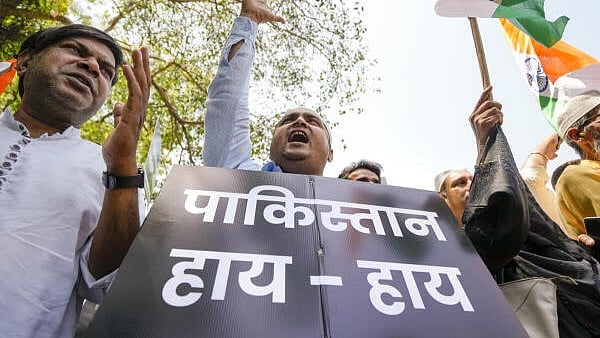
People hold placards during a protest march by BJP along with Anti-Terror Action Forum and other organisations towards the Pakistan High Commission against the recent Pahalgam terror attack, in New Delhi.
Credit: PTI Photo
Kashmir Resistance, also known as The Resistance Front, has claimed responsibility for Tuesday's attack on tourists in Indian-administered Kashmir's Pahalgam.
TRF is a proxy of the banned Pakistan-based Lashkar-e-Taiba (LeT).
As India turns up the heat on Pakistan with what is seen as retaliatory measures after the carnage in Jammu and Kashmir on Tuesday that left 26 people, mostly tourists, dead, let us understand why offshoots of the Jaish-e-Muhammed (JeM) and Lashkar-e-Taiba (LeT) have 'shed' their Islamist identities.
“TRF was created post-abrogation of Article 370 and was strategically not given a religious identity. Why not Lashkar, though it is a shadow of Lashkar, because of the fact that at that time, Pakistan was under the FATF grey list and were under the scrutiny for terror financing and other things. So, this was a move which was basically designed to avoid scrutiny of FATF,(sic)” Moneycontrol quoted Dr Shalini Chawla, Distinguished Fellow at Centre for Air Power Studies (CAPS) as saying.
The Financial Action Task Force (FATF) grey list identifies countries that are unable to counter money laundering (ML), terrorist financing (TF), and proliferation financing (PF), and are need of increased monitoring.
This is not the first time a proxy organisation has wreaked havoc in the UT.
Last year, three shadow groups associated with the banned terror outfits Lashkar-e-Taiba and Jaish-e-Mohammed initially claimed responsibility for attack on pilgrims in Jammu, though they soon retracted their statements.
The People's Anti-Facist Force (PAFF), Revival of Resistance (both linked to Jaish), and The Resistance Front (affiliated with Lashkar-e-Taiba) initially took to social media to assert their involvement in the attack on the bus travelling from Shiv Khori to Katra in Reasi, officials said.
Over the years, Pakistan has faced pressure globally to monitor its terrorism, and the United Nations has declared Lashkar-e-Taiba (LeT) and Jaish-e-Mohammed (JeM) as terrorist organisations.
In an attempt to deflect accountability and scrutiny, Pakistan has been promoting proxy groups that lack explicit religious branding, for instance, The Resistance Front (TRF), which was reportedly formulated after the abrogation of Article 370 in 2019.
"With these seemingly innocuous monikers, groups like LeT and JeM cloaked their jihadist ideology and intensified terroist activities in Kashmir exploiting the rhetoric of residence and rights to further their agenda and fuel violence, while also helping their chief backer Pakistan peddle their alibi about terrorism in J&K being a homegrown affailr, The Times of India quoted a security officer as saying.
An organisation like the TRF that claims to be indigenous, secular "resistance movement", reportedly allows Pakistan to sponsor violence in Kashmir, with less diplomatic cost.
The rebranding of these terror outfits is also their attempt to pass terrorism as an act of political resistance within the Union Territory. Even the defence minister of Pakistan called the attack in Pahalgam - "home-grown violence".
Similarly, a minister in Pakistan’s Punjab government on Wednesday said: "Any misadventure by India under false flag pretext will have dire consequences," Punjab’s Information Minister Azma Bokhari said.
The term “false flag” insinuates that India itself was behind the Jammu and Kashmir incident and it is meant to create an excuse for action against Pakistan.
Meanwhile, Prime Minister Narendra Modi on Thursday declared that the killers of Pahalgam will be pursued “to the ends of the earth” and promised to “identify, track and punish every terrorist and their backers”.
(With PTI inputs)
